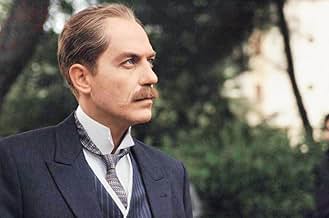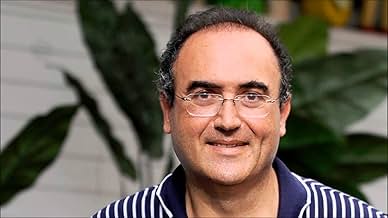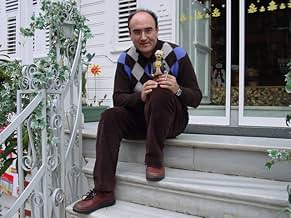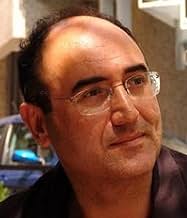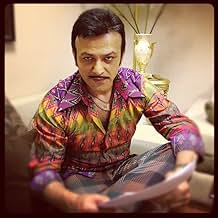Veda
- 2010
- 1 h 54 min
AVALIAÇÃO DA IMDb
7,2/10
7,9 mil
SUA AVALIAÇÃO
Adicionar um enredo no seu idiomaStory based on the memoirs of Salih Bozok, which traces the life of Mustafa Kemal Atatürk.Story based on the memoirs of Salih Bozok, which traces the life of Mustafa Kemal Atatürk.Story based on the memoirs of Salih Bozok, which traces the life of Mustafa Kemal Atatürk.
- Prêmios
- 1 vitória e 4 indicações no total
Özge Özpirinçci
- Fikriye Hanim
- (as Özge Özpirinççi)
Avaliações em destaque
If this movie is outstanding, it is certainly by it's ability to dodge any depth. No significant analysis of any character, no solid study of the historical context or stake, just a superficial picture of the events through a soap-like art. The author's purpose to grossly suggest along the movie his narration is a jewel of subtle understatement, as a reflection of the oriental sensibility, doesn't produce any effect but a real tediousness. Confronting with such imposture, one could naturally consider this a suggested work to embellish a vanishing symbol, facing times of trouble. It's few to say this subject deserves a better handling: the birth of a modern nation, the fate of millions of people involved, yesterday and today, the difficult questions of liberty and democracy are the real, complete and achieved understatement here.
5zvz
Not being a historian myself by any measure, I doubt anyone would argue that Ataturk is one of the greats who does deserve his story told in a great movie. This attempt unfortunately doesn't cut it.
The storyline is quite boring, scenes are artificial in a sense that they don't facilitate the story in necessary scale. Quite many scenes seemed redundant altogether. Acting is mostly poor - overacting is often the case. I'd expect larger focus on his state matters than personal life, which seemed to be theme of this movie. I truly hope that someone takes another shot at telling Ataturk's story. A team of better writers, actors and director is essential to make it! 5/10. That high only because the movie is of some historical importance.
The storyline is quite boring, scenes are artificial in a sense that they don't facilitate the story in necessary scale. Quite many scenes seemed redundant altogether. Acting is mostly poor - overacting is often the case. I'd expect larger focus on his state matters than personal life, which seemed to be theme of this movie. I truly hope that someone takes another shot at telling Ataturk's story. A team of better writers, actors and director is essential to make it! 5/10. That high only because the movie is of some historical importance.
This film especially emphasizes important events or milestones in Atatürk's life from Salih Bozok's eye. Expressing way of this story very emotional. If you have got little knowledge about these years, it is not possible to cry. Of course this film shows part of a history with Atatürk's life but not telling in a epic way. First time I like Zülvi Livaneli's work. It's so hard to talk about these years objectively. And I once again admired Atatürk. Maybe because of his great success and admiration for Atatürk, people think this kind of movies not enough and ineffective. Maybe that's right I agree in some sense with this idea. Although there is no accomplished biographical movies about Atatürk, we should respect endeavor of this filmmakers. Thank you everyone who contributed to this thought- provoking story.
Great epic drama of Mustafa Kemal Atatürka, who is still regarded to this day as one of the most important political leaders of the 20th century - who was not only a great revolutionary statesman, but also the founding father of the Republic of Turkey. This film of Kemal Atatürka also presents beautifully the profound political vision of a statesman, who sees the inevitability of change that Turkey had to undergo during the early twentieth century, making Kemal Atatürka the revolutionary statesman Turkey needed during that time, so that Turkey could be modernized and improved - and thereby making the country part of the International Community. The film also gives a very profound and moving portrayal of Kemal Atatürk's friends and family - in particular his mother and his beloved friends, Fikriye Hanim and Salih Bozok. Kemal Atatürka and his beloved ones are all portrayed as great human beings, who not only show deep love and courage; but also a capacity for fear, vulnerability and deep emotions.
Mustafa Kemal Ataturk might be the only great man whose life has not been cinematized properly enough. Along with Ziya Öztan's Cumhuriyet (which is more like a Turkish independence movie than a Ataturk biograph)and Can Dundar's widely criticized Mustafa this is actually the first feature length movie on Ataturk. While Can Dundar's Mustafa was a botched up effort to knock Mustafa Kemal off his pedestal and humanize him, Livaneli's movie re-puts him on his perch. Livaneli's Veda starts when Ataurk is on his deathbed. Salih Bozok, who has been a friend to him since he was six is beside him. He calls for his son and tells him that if Ataturk passes away he will end his own life too.Then he starts to write what he recollects about the great leader. So the whole movie,at first glance,seems to be only from Salih Bozok's point of view. When it comes to history one man's point of view should be able to change the whole history you know about, shouldn't it?
Ataturk was one of the greatest men of the century he lived in and we are aware of the fact that his life could not be grasped in a 120 minute movie so it should be understandable that a movie may focus on one part of his life but exactly on what side of his life Livaneli focuses? From Bozok's eyes, Livaneli offers pieces of vignettes or short, impressionistic scenes that do not sound like an eye opener. For instance, the only tangible scene about his childhood is what young Kemal thinks about a children's game like leapfrog. Apparently, the writer and the director want us to think that Ataturk was too great to bend but not modest enough not to vault over other's stooped backs. If you would like to show someone as a child prodigy there are way better means to do that. Other than that the movie does not tell you anything new about Ataturk's childhood or teenage years let alone the fact that the teenage actor,Bartunç Akbaba,playing Musta Kemal offers a pretty wooden performance. Ataturk was an "homme de guerre" and wars are an inevitable part of "gens de guerre". The only scene you see Mustafa Kemal on the war field is the Gallipoli campaign. Let alone the fact that this amazing and unbelievable victory in Turkish history looks more like a poor reconstruction scene from a documentary, most of the little scene focuses on just a ditch.
When you are making a biopic your forte is supposed to be "character development." In Veda, it looks like that there are not many dynamic characters that level up over the course of the narrative.Other than the two major women who walk into Ataturk's life, no character changes a bit. At some point you think you are watching a movie about Fikriye Hanım vs. Latife Hanım. What about Ataturk's feelings on that struggle between Fikriye,who was representing the Orient and Latife who was the Occident?
While Veda duly notes that Ataturk resisted the pressures of historic enmities or "atrocity-mongering between the societies" it never mentions the resistance he met while realizing his reforms.To a foreign layman, the reforms may seem quite ordinary.Those reforms were historically unprecedented and it caused a major resistance from anti-secular circles in Anatolia which still goes on as a sort of Kulturkampf today.
I might prolong this comment but I guess I made myself clear.As a nation we tend to exalt our movies for no reason (like we have done for "Breath") but movies are not made for just one nation.They are made for the whole world to see. Livaneli's effort may be a worthy one(soundtracks,cinematography,costumes and some visual effects were upsides of the movie)but it's not enough to make the whole world see the great leader on the silver screen. I believe, the more movies are made on Ataturk, the better we will understand his legacy.
Ataturk was one of the greatest men of the century he lived in and we are aware of the fact that his life could not be grasped in a 120 minute movie so it should be understandable that a movie may focus on one part of his life but exactly on what side of his life Livaneli focuses? From Bozok's eyes, Livaneli offers pieces of vignettes or short, impressionistic scenes that do not sound like an eye opener. For instance, the only tangible scene about his childhood is what young Kemal thinks about a children's game like leapfrog. Apparently, the writer and the director want us to think that Ataturk was too great to bend but not modest enough not to vault over other's stooped backs. If you would like to show someone as a child prodigy there are way better means to do that. Other than that the movie does not tell you anything new about Ataturk's childhood or teenage years let alone the fact that the teenage actor,Bartunç Akbaba,playing Musta Kemal offers a pretty wooden performance. Ataturk was an "homme de guerre" and wars are an inevitable part of "gens de guerre". The only scene you see Mustafa Kemal on the war field is the Gallipoli campaign. Let alone the fact that this amazing and unbelievable victory in Turkish history looks more like a poor reconstruction scene from a documentary, most of the little scene focuses on just a ditch.
When you are making a biopic your forte is supposed to be "character development." In Veda, it looks like that there are not many dynamic characters that level up over the course of the narrative.Other than the two major women who walk into Ataturk's life, no character changes a bit. At some point you think you are watching a movie about Fikriye Hanım vs. Latife Hanım. What about Ataturk's feelings on that struggle between Fikriye,who was representing the Orient and Latife who was the Occident?
While Veda duly notes that Ataturk resisted the pressures of historic enmities or "atrocity-mongering between the societies" it never mentions the resistance he met while realizing his reforms.To a foreign layman, the reforms may seem quite ordinary.Those reforms were historically unprecedented and it caused a major resistance from anti-secular circles in Anatolia which still goes on as a sort of Kulturkampf today.
I might prolong this comment but I guess I made myself clear.As a nation we tend to exalt our movies for no reason (like we have done for "Breath") but movies are not made for just one nation.They are made for the whole world to see. Livaneli's effort may be a worthy one(soundtracks,cinematography,costumes and some visual effects were upsides of the movie)but it's not enough to make the whole world see the great leader on the silver screen. I believe, the more movies are made on Ataturk, the better we will understand his legacy.
Você sabia?
Principais escolhas
Faça login para avaliar e ver a lista de recomendações personalizadas
- How long is Veda - Atatürk?Fornecido pela Alexa
Detalhes
- Data de lançamento
- País de origem
- Centrais de atendimento oficiais
- Idioma
- Também conhecido como
- Veda - Atatürk
- Locações de filme
- Tessalônica, Grécia(location)
- Empresa de produção
- Consulte mais créditos da empresa na IMDbPro
Bilheteria
- Orçamento
- US$ 6.000.000 (estimativa)
- Faturamento bruto mundial
- US$ 55.024.621
- Tempo de duração
- 1 h 54 min(114 min)
- Cor
- Proporção
- 2.35 : 1
Contribua para esta página
Sugerir uma alteração ou adicionar conteúdo ausente

